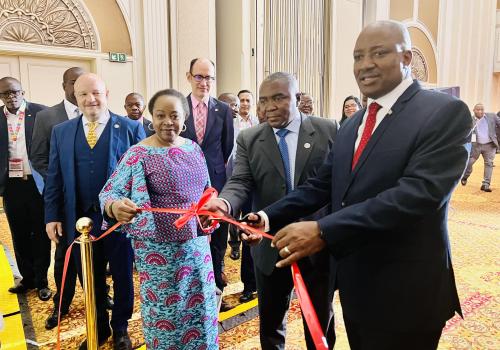The Southern African Development Community (SADC) and the United Nations Food and Agriculture Organisation (FAO) hosted workshop to mark the end of the ‘Support towards the Operationalization of the SADC Regional Agricultural Policy’, (STOSAR) Project which was funded by the European Union (EU) through the European Development Fund (EDF 11) to the tune of Euro 9 million to support implementation of the SADC Regional Agricultural Policy (RAP). The workshop was held on 20-21 February 2024 at Gaborone International Conference Centre (GICC), in Botswana.
The Workshop, amongst others, was convened to highlight and share the achievements, best practices and lessons learnt during the implementation of the STOSAR project in addition to presenting STOSAR as a foundation on which other national and regional initiatives can build.
The implementation of the STOSAR Project commenced in 2018, focusing on three main areas namely; agricultural information management systems for data-driven decision-making; tackling key transboundary animal diseases and crop pests that threaten growth, sustainability, market access and trade; and food and nutrition security.
Through the collaboration of the SADC Member States, EU and FAO, in partnership with the region’s Centres of Excellence, STOSAR assisted to create pathway to bring about positive transformation of the agricultural sector by providing innovative, inclusive, and sustainable solutions to challenges affecting food production, productivity, and competitiveness of the region’s agriculture sector.
The Guest of Honour at the opening of the Workshop, Honourable Fidelis Molao, Minister of Agriculture of the Republic of Botswana hailed the achievements made by the STOSAR project and highlighted the need to sustain the momentum achieved under the STOSAR Project and ensuring that its gains continue to drive agricultural sector which has long been a bedrock for regional integration and sustainable socio-economic transformation of the SADC region.
"Let us reaffirm our commitment to advancing agricultural development in the SADC region through collaborative efforts and shared aspirations, building a future where agriculture thrives as a cornerstone of sustainable development,” said Hon. Molao.
Ms. Angele Makombo N’Tumba, SADC Deputy Executive Secretary for Regional Integration noted that, through concerted efforts and collaboration among SADC Member States, the STOSAR Project has made remarkable strides in improving agricultural productivity, enhancing food security, and promoting sustainable agricultural practices.
“Today, we all gather to celebrate not only the progress made in the implementation of the SADC Regional Agricultural Policy but also to reaffirm our commitment to regional integration and agricultural development,” said Ms. N’Tumba. She added that the SADC Regional Agricultural Policy serves as a cornerstone in fostering deeper regional integration by harmonising agricultural strategies, facilitating trade, and promoting collaboration among SADC Member States towards a more resilient and prosperous agricultural sector.
Mr Jose Becerra, Deputy Head of Cooperation at the EU Delegation in Botswana and SADC, informed delegates that the EU is working with the SADC Secretariat to develop successor programme, STOSAR II Project, a new programme which will contribute towards addressing Industrial Development and Market Integration through a transformed Agriculture Sector that will put into practice sustainable management of the environment and its natural resources.
On his part, Dr. Patrice Talla, FAO Subregional Coordinator for Southern Africa commended all the partners of the implementation of the STOSAR project for their dedication towards the achievements made by the project. Amongst others, Dr Talla indicated that the STOSAR project has enabled SADC Member States to develop capacity for timely and accurate pest risk analysis, both to protect their territories from pests, and to get access to international markets by ensuring compliance with the requirements of importing countries.
This workshop brought together representatives from the SADC Member States from line ministries relevant to the STOSAR Project, representatives from the SADC Secretariat, EU and FAO, International Development Partners, Centres of Excellence, Parastatals, Academia, Farmer Unions, and Private Sector partners.

